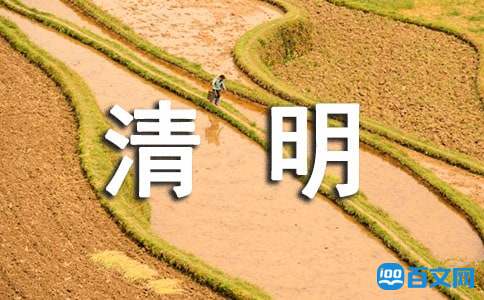关于清明节习俗的英语作文
清明节是一个纪念祖先的节日。主要的纪念仪式是扫墓,扫墓是慎终追远、郭亲睦邻及行孝的具体表现。下面是小编分享的关于清明节的英语作文,欢迎大家阅读!

清明节英语作文【1】
Qing Ming is a time to remember the dead and the dearly departed. More important, it is a period to honour and to pay respect to one's deceased ancestors and family members. Because it reinforces the ethic of filial piety, Qing Ming is a major Chinese festival.
Literally meaning "clear" (Qing) and "bright" (Ming), this Chinese festival falls in early spring, on the 106th day after the winter solstice. It is a "spring" festival, and it is an occasion for the whole family to leave the home and to sweep the graves of their forebears. Chinese being practical people this sweeping of the graves is given an extended period, that is, 10 days before and after Qing Ming day. Among some dialect groups a whole month is allocated.
清明节是一个纪念祖先的节日。主要的纪念仪式是扫墓,扫墓是慎终追远、郭亲睦邻及行孝的.具体表现;基于上述意义,清明节因此成为华人的重要节日。 清明节是在仲春和暮春之交,也就是冬至后的106天。扫墓活动通常是在清明节的前十天或后十天。有些地域的人士的扫墓活动长达一个月。
清明节英语作文【2】
An old man takes one last look before leaving the City Cemetery at Biandanshan of Wuhan, Central China's Hubei Province.In ancient times, people celebrated Qing Ming Jie with dancing, singing, picnics, and kite flying. Colored boiled eggs would be broken to symbolize the opening of life. In the capital, the Emperor would plant trees on the palace grounds to celebrate the renewing nature of spring. In the villages, young men and women would court each other.
清明节英语作文【3】
The Qingming (Pure Brightness) Festival is one of the 24 seasonal division points in China, falling on April 4-6 each year. After the festival, the temperature will rise up and rainfall increases. It is the high time for spring plowing and sowing. But the Qingming Festival is not only a seasonal point to guide farm work, it is more a festival of commemoration.
The Qingming Festival sees a combination of sadness and happiness.
This is the most important day of sacrifice. Both the Han and minority ethnic groups at this time offer sacrifices to their ancestors and sweep the tombs of the diseased. Also, they will not cook on this day and only cold food is served.
The Hanshi (Cold Food) Festival was usually one day before the Qingming Festival. As our ancestors often extended the day to the Qingming, they were later combined.
On each Qingming Festival, all cemeteries are crowded with people who came to sweep tombs and offer sacrifices. Traffic on the way to the cemeteries becomes extremely jammed. The customs have been greatly simplified today. After slightly sweeping the tombs, people offer food, flowers and favorites of the dead, then burn incense and paper money and bow before the memorial tablet.
In contrast to the sadness of the tomb sweepers, people also enjoy hope of Spring on this day. The Qingming Festival is a time when the sun shines brightly, the trees and grass become green and nature is again lively. Since ancient times, people have followed the custom of Spring outings. At this time tourists are everywhere.
People love to fly kites during the Qingming Festival. Kite flying is actually not limited to the Qingming Festival. Its uniqueness lies in that people fly kites not during the day, but also at night. A string of little lanterns tied onto the kite or the thread look like shining stars, and therefore, are called "god's lanterns."
The Qingming Festival is also a time to plant trees, for the survival rate of saplings is high and trees grow fast later. In the past, the Qingming Festival was called "Arbor Day". But since 1979, "Arbor Day" was settled as March 12 according to the Gregorian calendar.
【关于清明节习俗的英语作文】相关文章: